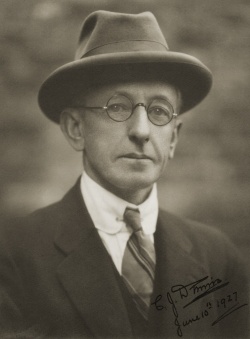C.J Dennis
C. J. Dennis was a poet and author, widely known for his popular book The Songs of a Sentimental Bloke. He was born in Auburn, South Australia, on 7 September 1876. C. J. was well-known for including the common language of the Australian people in his poetry, using slang and abbreviated words to a great extent, in the style that was used by the working people of the time.
Dennis had his poetry published in various magazines and newspapers, such as The Bulletin and The Worker, sometimes signing his writings simply as “Den” or “C.J.D.”. Although his name was Clarence Michael James Dennis, he dropped the “Michael” apparently due to a desire to distance himself from his maternal grandfather, Michael Tobin, who he didn’t like; also, he thought that the name Clarence (or “Clarrie”, as he was known as a child) sounded a bit posh or pretentious, and so therefore he was generally known as “Den” or “C. J.”.
Den put his journalistic and poetic talents to good use, and worked on The Critic, The Gadfly (which he co-founded), and (much later on) The Herald (Melbourne).
His first book, Backblock Ballads and Other Verses (1913), was not a great success, selling quite poorly; however, his second book The Songs of a Sentimental Bloke (1915), achieved a phenomenal popularity and gave him star status amongst the reading public. He re-published many of the poems from his first book (along with some additional poetry) in a new volume, Backblock Ballads and Later Verses (1918), which then sold quite well.
C. J. Dennis produced a large number of poems in various books during his lifetime, although The Songs of a Sentimental Bloke was to remain his top seller. It gave him a great deal of popularity amongst Australian readers, which assisted in the sale of his other books. The story of the “Sentimental Bloke” was also made into a silent movie in 1919; later on, using newly-produced film technology, it was made into a “talkie” movie in 1932.
Politically, he was pro-labour, which can be clearly seen in his first book, as well as in his early newspaper writings (including his short-term work for the trade union newspaper The Call in 1914). However, so as to appeal to as many people as possible, he decided to mostly keep his political leanings out of his later books (for example, he asked Henry Lawson to alter the preface which he had written for The Songs of a Sentimental Bloke, so that it wouldn’t be too political in nature).
Although he grew up in Laura (South Australia), and worked for many years in Adelaide, it was whilst he was in Victoria that C.J. became successful and famous. He used his new-found fortune to purchase a property in Toolangi, in country Victoria, where he lived with his wife, Olive (nee Herron), whom he married in 1917 (she died in 1968, 30 years after the passing of the poet).
Throughout much of his life Dennis was plagued by asthma, as well as having a severe problem with alcohol, which impacted upon his writings and working life; although his wife tried to minimise his tendency to drink.
C. J. Dennis died of cardio-respiratory failure (brought on by an asthma attack) in Melbourne, Victoria, on 22 June 1938.
Books by C. J. Dennis:
- 1913: Backblock Ballads and Other Verses, Melbourne: E. W. Cole, [1913]
- 1915: The Songs of a Sentimental Bloke, Sydney: Angus & Robertson
- 1916: The Moods of Ginger Mick, Sydney: Angus & Robertson
- 1917: Doreen, Sydney: Angus & Robertson, [1917]
- 1917: The Glugs of Gosh, Sydney: Angus & Robertson
- 1918: Backblock Ballads and Later Verses, Sydney: Angus & Robertson
- 1918: Digger Smith, Sydney: Angus & Robertson
- 1919: Jim of the Hills, Sydney: Angus & Robertson
- 1921: A Book for Kids, Sydney: Angus & Robertson, [1921] [republished in 1935 as Roundabout]
- 1924: Rose of Spadgers: A Sequel to “Ginger Mick”, Sydney: Cornstalk Publishing
- 1932: “I Dips Me Lid” to the Sydney Harbour Bridge, Rhodes (NSW): Lewis Berger & Sons, [1932]
- 1935: The Singing Garden, Sydney: Angus & Robertson
Selected poems by C. J. Dennis (not included in his books):
- A meditation upon the glad new year — with poetic interludes [2 January 1907]
- To a Dead Mate [5 September 1922]
- Anzac [25 April 1927]
